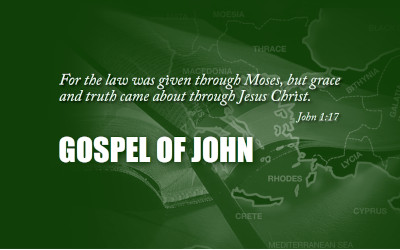John 4:1-22
The water that I will give. Secret revealed. New place of worship. You worship what you do not know.
(Bấm vào đây để đọc tiếng Việt)
THE WATER THAT I WILL GIVE
 1Now when Jesus knew that the Pharisees had heard that he was winning and baptizing more disciples than John 2(although Jesus himself was not baptizing, but his disciples were), 3he left Judea and set out once more for Galilee. 4But he had to pass through Samaria. 5Now he came to a Samaritan town called Sychar, near the plot of land that Jacob had given to his son Joseph. 6Jacob’s well was there, so Jesus, since he was tired from the journey, sat right down beside the well. It was about noon. 7A Samaritan woman came to draw water. Jesus said to her, “Give me some water to drink.” 8(For his disciples had gone off into the town to buy supplies.) 9So the Samaritan woman said to him, “How can you – a Jew – ask me, a Samaritan woman, for water to drink?” (For Jews use nothing in common with Samaritans.) 10Jesus answered her, “If you had known the gift of God and who it is who said to you, ‘Give me some water to drink,’ you would have asked him, and he would have given you living water.” 11“Sir,” the woman said to him, “you have no bucket and the well is deep; where then do you get this living water? 12Surely you’re not greater than our ancestor Jacob, are you? For he gave us this well and drank from it himself, along with his sons and his livestock.” 13Jesus replied, “Everyone who drinks some of this water will be thirsty again. 14But whoever drinks some of the water that I will give him will never be thirsty again, but the water that I will give him will become in him a fountain of water springing up to eternal life.” 15The woman said to him, “Sir, give me this water, so that I will not be thirsty or have to come here to draw water.” (John 4:1-15)
1Now when Jesus knew that the Pharisees had heard that he was winning and baptizing more disciples than John 2(although Jesus himself was not baptizing, but his disciples were), 3he left Judea and set out once more for Galilee. 4But he had to pass through Samaria. 5Now he came to a Samaritan town called Sychar, near the plot of land that Jacob had given to his son Joseph. 6Jacob’s well was there, so Jesus, since he was tired from the journey, sat right down beside the well. It was about noon. 7A Samaritan woman came to draw water. Jesus said to her, “Give me some water to drink.” 8(For his disciples had gone off into the town to buy supplies.) 9So the Samaritan woman said to him, “How can you – a Jew – ask me, a Samaritan woman, for water to drink?” (For Jews use nothing in common with Samaritans.) 10Jesus answered her, “If you had known the gift of God and who it is who said to you, ‘Give me some water to drink,’ you would have asked him, and he would have given you living water.” 11“Sir,” the woman said to him, “you have no bucket and the well is deep; where then do you get this living water? 12Surely you’re not greater than our ancestor Jacob, are you? For he gave us this well and drank from it himself, along with his sons and his livestock.” 13Jesus replied, “Everyone who drinks some of this water will be thirsty again. 14But whoever drinks some of the water that I will give him will never be thirsty again, but the water that I will give him will become in him a fountain of water springing up to eternal life.” 15The woman said to him, “Sir, give me this water, so that I will not be thirsty or have to come here to draw water.” (John 4:1-15)
Just as the Holy Spirit’s baptism of Jesus differs from that of John the Baptist, the water offered by Jesus contrasts with the water drawn by the Samaritan at Jacob’s well. Imbibing Jesus’ water signifies embracing faith, being fulfilled in the yearning for God’s righteousness. Jesus’ water is never intended to satiate physical thirst.
The Samaritan’s misconception about the purpose of Jesus’ water resembles the misinterpretation by many Christians of Isaiah 53:5: “Through his wounds, we are healed.” Jesus’ crucifixion was meant to secure forgiveness of our sins and thereby grant eternal life, not to ensure the uninterrupted continuation of our physical existence.
SECRET REVEALED
16He said to her, “Go call your husband and come back here.” 17The woman replied, “I have no husband.” Jesus said to her, “Right you are when you said, ‘I have no husband,’ 18for you have had five husbands, and the man you are living with now is not your husband. This you said truthfully!”. (John 4:16-18)
Arriving at the well around noon, the Samaritan woman likely chose this time to minimize her interactions with potential well-goers. She had two significant reasons for doing so: firstly, her Samaritan identity made her an object of disdain among the Jews; and secondly, her history of having five husbands, as pointed out by Jesus, subjected her to societal mockery. However, Jesus’ manner and tone possibly put her at ease, enabling her to continue conversing with him.
This passage vividly illustrates the truth that Jesus’ purpose was not to pass judgment on the world (John 3:17), but to rescue it. Remarkably, he refrained from condemning her for her choices. After all, why would God condemn her when “all have sinned and fall short of God’s glory” (Romans 3:23)? In the presence of One characterized by grace and truth, the woman’s hidden past was exposed. Paradoxically, this revelation became a source of liberation, for it paved the way for healing, peace, and the restoration of everything to its rightful order.
NEW PLACE OF WORSHIP
19The woman said to him, “Sir, I see that you are a prophet. 20Our fathers worshiped on this mountain, and you people say that the place where people must worship is in Jerusalem.” 21Jesus said to her, “Believe me, woman, a time is coming when you will worship the Father neither on this mountain nor in Jerusalem. (John 4:19-21)
Regardless of whether you identify as a Jew or a Samaritan, Jesus has ensured that the place of worship is now within reach for everyone. In the forthcoming lesson, we will observe how he has relocated it to a realm referred to as “spirit and truth.”
YOU WORSHIP WHAT YOU DO NOT KNOW
22You people worship what you do not know. We worship what we know, because salvation is from the Jews. (John 4:22)
Every religion incorporates a mode of worship. Therefore, the challenge doesn’t stem from people’s lack of engagement in worship, but rather from their involvement in worship without a comprehensive grasp or awareness of their chosen focus of worship. In Romans 10:2, Paul highlights that individuals can be “enthusiastic for God, yet their enthusiasm deviates from the truth.” Thus, what significance does zeal hold when divorced from truth? Numerous individuals, driven by profound fervor, align themselves with falsehoods that inevitably guide them towards a path of downfall. The primary rationale behind people falling prey to deceptive prophets or instructors is their deficiency in understanding the truth. In this context, their zeal remains inadequate for ensuring salvation.
Nghi Nguyen
- Scripture quoted by permission. All scripture quotations, unless otherwise indicated, are taken from the NET Bible® copyright ©1996-2006 by Biblical Studies Press, L.L.C. All rights reserved.
Disclaimer: This is my own opinion on the topic, which does not necessarily reflect the church's theology, or beliefs of the individuals in it — Nghi Nguyen
